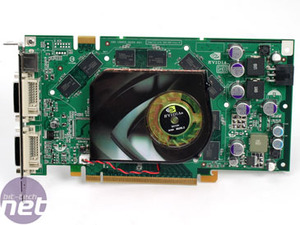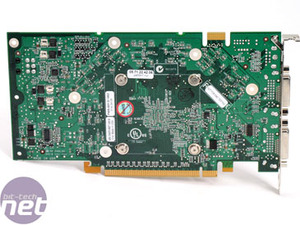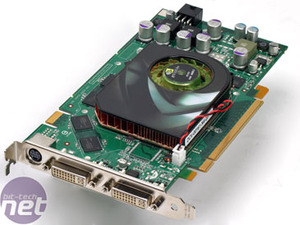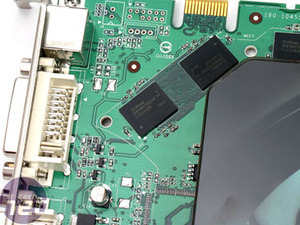Last week, NVIDIA announced the GeForce 7900 GS and GeForce 7950 GT video cards in the run up to the autumn spending spree. We haven't looked at the GeForce 7900 GS yet, due to the lack of time we were given between receiving hardware and the launch date. However, you can expect a round up of GeForce 7900 GS cards next week. Today's focus is on the other card that NVIDIA launched - the GeForce 7950 GT - which should be available to buy by the time you have finished reading this review.
Along with NVIDIA's reference design card, we have a retail XFX GeForce 7950 GT 570M Extreme in house too. Over the past few days, we've been putting the cards through our array of real-world gameplay scenarios in order to find out whether the cards are any good. Before we get on to the benchmarks though, lets have a look at the two cards we have here.
Basically, GeForce 7950 GT is launching at the same price point that GeForce 7900 GT launched at in March. It comes with a load more performance and an additional 256MB of memory that is starting to become a requirement at higher resolutions. It's based on the same G71 chip and comes with all pipelines intact, meaning that there are 24 pixel pipelines, 8 vertex shaders and 16 pixel output engines.
The reference design is clocked at 550/1400MHz - that's a 100MHz increase in core speed over GeForce 7900 GT and an 80MHz increase in memory clock. In comparison, it's 100MHz slower than GeForce 7900 GTX's core and 200MHz slower when it comes to memory clock speed. The reduced clock speeds means that NVIDIA can use a smaller cooling solution. As a result, the reference card uses the same cooler as the one we've seen on NVIDIA's GeForce 7900 GT.
The variable speed fan control is a little better than what we've seen on GeForce 7900 GT, which spent most of its time running at full whack. Although the fan speed control is a little better, the reference card is still noiser than we would have liked to see. Considering that NVIDIA has designed effective but silent coolers for GeForce 7950 GX2 and GeForce 7900 GTX, we are left a little disappointed by the reference cooler on GeForce 7950 GT.
Putting our disappointment with the cooler to one side for now, the card itself uses virtually the same printed circuit board design as GeForce 7900 GT. In fact, you would be hard pushed to tell the difference between GeForce 7950 GT and GeForce 7900 GT if you weren't a memory freak and there were no markings to otherwise identify the different cards.
The two DVI ports on the back are both dual-link DVI and thus capable of running at resolutions up to 2560x1600. Also, much like the GeForce 7950 GX2, the DVI ports are HDCP enabled by default on all GeForce 7950 GT implementations - that's definitely a good thing in our eyes. The port array is completed with NVIDIA's 7-pin HDTV-out mini-din connector. You can plug an S-Video connector directly into the back of the card, while component and composite outputs are accessible via a dongle.
Along with NVIDIA's reference design card, we have a retail XFX GeForce 7950 GT 570M Extreme in house too. Over the past few days, we've been putting the cards through our array of real-world gameplay scenarios in order to find out whether the cards are any good. Before we get on to the benchmarks though, lets have a look at the two cards we have here.
Where does it fit?
GeForce 7950 GT is the second addition to NVIDIA's GeForce 7950-series - the other being the flagship GeForce 7950 GX2. However, unlike the GeForce 7950 GX2, the GeForce 7950 GT is based on a single G71 chip and bears more resemblances with a GeForce 7900-series card than it does with the GeForce 7950 GX2. This could be a little confusing for the consumer, but we feel that NVIDIA is looking to phase GeForce 7900 GTX and GeForce 7900 GT out of the market, whether there is demand for those products or not.Basically, GeForce 7950 GT is launching at the same price point that GeForce 7900 GT launched at in March. It comes with a load more performance and an additional 256MB of memory that is starting to become a requirement at higher resolutions. It's based on the same G71 chip and comes with all pipelines intact, meaning that there are 24 pixel pipelines, 8 vertex shaders and 16 pixel output engines.
The reference design is clocked at 550/1400MHz - that's a 100MHz increase in core speed over GeForce 7900 GT and an 80MHz increase in memory clock. In comparison, it's 100MHz slower than GeForce 7900 GTX's core and 200MHz slower when it comes to memory clock speed. The reduced clock speeds means that NVIDIA can use a smaller cooling solution. As a result, the reference card uses the same cooler as the one we've seen on NVIDIA's GeForce 7900 GT.
The variable speed fan control is a little better than what we've seen on GeForce 7900 GT, which spent most of its time running at full whack. Although the fan speed control is a little better, the reference card is still noiser than we would have liked to see. Considering that NVIDIA has designed effective but silent coolers for GeForce 7950 GX2 and GeForce 7900 GTX, we are left a little disappointed by the reference cooler on GeForce 7950 GT.
Putting our disappointment with the cooler to one side for now, the card itself uses virtually the same printed circuit board design as GeForce 7900 GT. In fact, you would be hard pushed to tell the difference between GeForce 7950 GT and GeForce 7900 GT if you weren't a memory freak and there were no markings to otherwise identify the different cards.
The two DVI ports on the back are both dual-link DVI and thus capable of running at resolutions up to 2560x1600. Also, much like the GeForce 7950 GX2, the DVI ports are HDCP enabled by default on all GeForce 7950 GT implementations - that's definitely a good thing in our eyes. The port array is completed with NVIDIA's 7-pin HDTV-out mini-din connector. You can plug an S-Video connector directly into the back of the card, while component and composite outputs are accessible via a dongle.

MSI MPG Velox 100R Chassis Review
October 14 2021 | 15:04














Want to comment? Please log in.